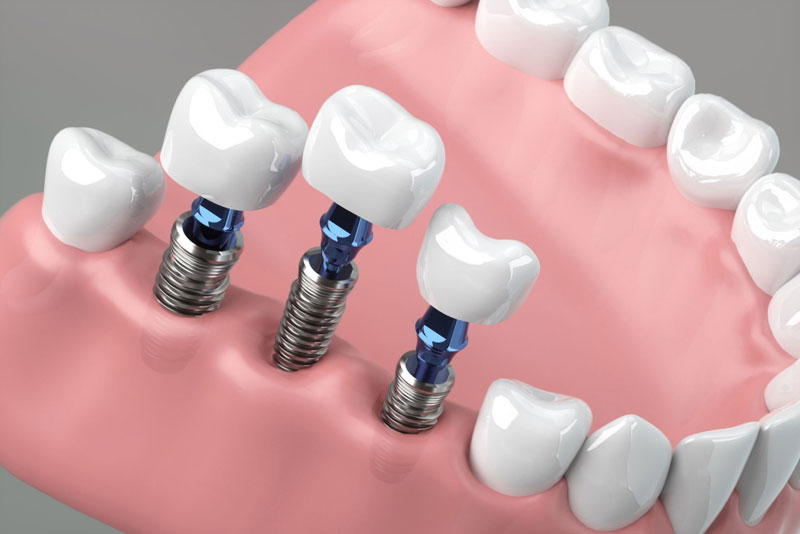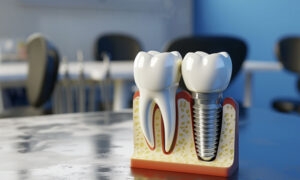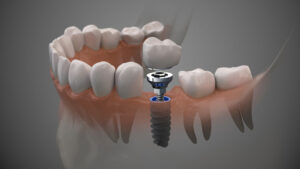Dental implants in Miles City, MT are a gold standard tooth replacement option for many reasons. With dental implants, the beauty, functionality, and the health of the patient’s smile will be restored. How many teeth, however, are dental implants able to replace? Luckily, at a skilled and trusted doctor’s office, any number of missing teeth can be replaced by dental implants.
Continue reading to learn more about the number of missing teeth dental implants can replace.
The Number Of Missing Teeth Dental Implants In Miles City, MT Replace
Dental implants can replace a single missing tooth, many missing teeth, or a full arch of missing teeth. By replacing missing teeth with dental implants, 99% of the patient’s dental functionality will be restored and they will have an aesthetically enhanced new smile.
How Exactly Is The Dental Implant Procedure Performed To Replace Missing Teeth
When people get treated with dental implants in Miles City, MT, small titanium, biocompatible dental implant posts are surgically placed into the patient’s jawbone. The dental implant posts are made to act like a natural tooth root, providing a sturdy anchor for the prosthesis (tooth crowns).
For those who have an insufficient amount of jawbone density to support their new smile, they will first need to be treated with bone grafting. Bone grafting is what allows the patient’s body to grow its own bone around the dental implant post. In order for patients to have a comfortable and anxiety-free dental implant placement experience, sedation dentistry will be administered to them.
Next, the doctor can put an abutment onto the dental implant post. The abutment is what attaches the dental implant post to the prosthesis. Once the patient’s jawbone has fully healed from their dental implant surgery, the final prosthesis can be attached to the dental implant post with the abutment. The color, shape, and size of the prosthesis is custom-made to give the patient beautiful new teeth that look natural in their smile.
By replacing missing teeth with dental implants, patients will be able to maintain a normal diet, speak clearly, and smile confidently. If taken care of properly, the results of a dental implant procedure should last a lifetime.
What Types Of Dental Implants Options Can My Missing Teeth Be Replaced With?
Dental implants can be used to replace one tooth, several teeth, or all of the teeth in a person’s upper or lower arch. The following shows how each dental implant option replaces missing teeth.
Single Dental Implants
People with one missing tooth can benefit from single dental implants. A single dental implant post, abutment, and tooth crown work together to seamlessly replace the single missing tooth, restoring both the function and aesthetics of the patient’s smile.
Implant Supported Dentures
For those with missing teeth, or for those who no longer want to deal with unstable traditional dentures, then they should get treated with implant supported dentures. In an implant supported dentures procedure, two or more dental implants are used to stabilize a denture, restoring the patient’s dental stability and comfort.
Full Mouth Dental Implants
When people have full arches of missing teeth, they can be effectively replaced with full mouth dental implants. With full mouth dental implants, four or more dental implants are used to support a full arch prosthesis, giving the patient a completely new smile.
What Happens If I Don’t Immediately Replace My Missing Teeth With Dental Implants?
Delaying the replacement of missing teeth can lead to jawbone density loss. Without the stimulation provided by tooth roots, the jawbone may resorb where there are missing teeth, giving the person an aged looking facial appearance.
The Impact Of Gum Disease On Tooth Loss
Gum disease, progressing from gingivitis to periodontitis, significantly contributes to tooth loss. In the advanced stages of gum disease, periodontal pockets form, fostering bacterial accumulation and causing the breakdown of periodontal ligaments.
This inflammation leads to jawbone resorption, which weakens the structural support for teeth so that they are loose. The chronic inflammatory state weakens tooth-supporting structures, making it challenging for teeth to withstand normal biting and chewing forces.
As gum disease advances, limited treatment options may necessitate the extraction of severely affected teeth. Moreover, gum disease is often associated with other oral health issues, creating a cascade effect that increases the risk of overall tooth loss.
Timely intervention, effective oral hygiene practices, and professional dental care are crucial in preventing gum disease progression and preserving the integrity of teeth. Early detection and management of gum disease are essential to mitigate the impact of gum disease on tooth loss, as well as maintain optimal oral health.
See Us Now So We Can Replace Your Missing Teeth With Dental Implants
Ready for a brand-new smile? Missing one or more teeth will no longer be an issue when we treat you with dental implants. Don’t hesitate to improve your smile with us. Get in contact with our doctors, , Dr. Barrie Matthews, and our exceptional team at our office by Miles City, MT to schedule your consultation!




